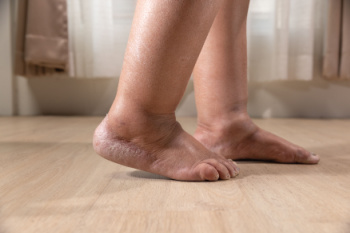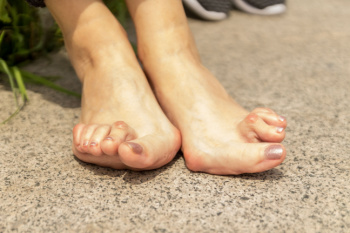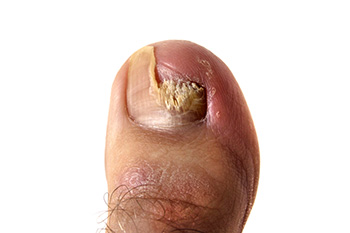Connect With Us
Blog

Swollen feet and ankles can arise from many different causes. An injury such as a sprain or fracture often leads to swelling, as the body responds with inflammation. Infections in the skin or soft tissue can also trigger painful swelling. Standing or sitting for long periods of time may cause fluid to pool in the lower limbs, while consuming foods high in salt can lead to water retention and discomfort. A podiatrist can evaluate the underlying cause, provide treatment, and recommend lifestyle changes or therapies to reduce swelling and prevent complications. If you are experiencing swollen feet or ankles, it is suggested that you consult a podiatrist who can offer effective relief and treatment tips for this condition.
Swollen feet can be a sign of an underlying condition. If you have any concerns, contact one of our podiatrists of Comprehensive Foot & Ankle Centers. Our doctors can provide the care you need to keep you pain-free and on your feet.
Swollen feet are a common ailment among pregnant women and people who stand or sit for extended periods. Aging may increase the possibility of swollen feet and patients who are obese often notice when their feet are swelling too. There may be medical reasons why swollen feet occur:
- Phlebitis - A condition that causes the veins to become inflamed and can also cause leg pain.
- Liver disease - This may lead to low blood levels of albumin which is a protein. This can cause fluid in the blood to pass into the tissues and several areas of the body can become swollen.
- Heart failure - When the heart doesn’t pump properly the blood that is normally pumped back to the heart can pool in the veins of the legs causing swollen feet.
- Kidney disease - One of the main functions of the kidneys is releasing excess fluid in the body. This type of condition can make it difficult for the kidneys to function properly, and as a result the feet may become swollen.
- Deep-vein thrombosis (DVT)- This is a serious condition where blood clots form in the veins of the legs. They can block the return of blood from the legs to the heart which may cause the feet to swell. It is important to be treated by a podiatrist if this condition is present.
Swollen feet can also be caused by bone and tendon conditions, including fractures, arthritis, and tendinitis. Additionally, there may be skin and toenail conditions and an infection may cause the feet to swell. Patients who take medicine to treat high blood pressure may be prone to getting swollen feet.
Many patients elevate their feet to help relieve the swelling and this is generally a temporary remedy. When a podiatrist is consulted the reason behind the swelling can be uncovered and subsequently treated.
If you have any questions please contact our offices located in Shepherdsville and Louisville, KY . We offer the newest diagnostic and treatment technologies for all your foot and ankle needs.

Rheumatoid arthritis, or RA, in the feet is an autoimmune condition where the immune system attacks joint tissues, causing inflammation, pain, and stiffness. Symptoms include swelling, tenderness, joint deformities, and difficulty walking. Causes are linked to immune system dysfunction, while risk factors include genetics and smoking. Over time, RA can damage cartilage and bone, leading to loss of mobility and chronic discomfort. A podiatrist can help by managing symptoms with custom orthotics, supportive footwear, and joint protection strategies. They can also provide advice on exercises to maintain flexibility. If foot pain or stiffness from RA is affecting daily life, it is suggested that you speak with a podiatrist who can guide you toward effective relief and management tips.
Because RA affects more than just your joints, including the joints in your feet and ankles, it is important to seek early diagnosis from your podiatrist if you feel like the pain in your feet might be caused by RA. For more information, contact one of our podiatrists of Comprehensive Foot & Ankle Centers. Our doctors will assist you with all of your podiatric concerns.
What Is Rheumatoid Arthritis?
Rheumatoid Arthritis (RA) is an autoimmune disorder in which the body’s own immune system attacks the membranes surrounding the joints. Inflammation of the lining and eventually the destruction of the joint’s cartilage and bone occur, causing severe pain and immobility.
Rheumatoid Arthritis of the Feet
Although RA usually attacks multiple bones and joints throughout the entire body, almost 90 percent of cases result in pain in the foot or ankle area.
Symptoms
- Swelling and pain in the feet
- Stiffness in the feet
- Pain on the ball or sole of feet
- Joint shift and deformation
Diagnosis
Quick diagnosis of RA in the feet is important so that the podiatrist can treat the area effectively. Your doctor will ask you about your medical history, occupation, and lifestyle to determine the origin of the condition. Rheumatoid Factor tests help to determine if someone is affected by the disease.
If you have any questions, please feel free to contact our offices located in Shepherdsville and Louisville, KY . We offer the newest diagnostic and treatment technologies for all your foot care needs.

Toenail fungus is a common infection caused by fungi that grow in warm, moist environments and affect the nail bed. It can lead to thickened, discolored, brittle, or distorted nails and may produce an unpleasant odor. Risk factors include excessive sweating, poor foot hygiene, walking barefoot in damp areas, and a weakened immune system. Causes include fungal exposure in communal showers, gyms, or from tight footwear. A podiatrist can diagnose the condition and provide treatments such as topical or oral medications, nail debridement, or advanced therapies. If you have signs of toenail fungus, it is suggested that you consult a podiatrist who can effectively treat this condition, which may include prescribed medication.
If left untreated, toenail fungus may spread to other toenails, skin, or even fingernails. If you suspect you have toenail fungus it is important to seek treatment right away. For more information about treatment, contact one of our podiatrists of Comprehensive Foot & Ankle Centers. Our doctors can provide the care you need to keep you pain-free and on your feet.
Symptoms
- Warped or oddly shaped nails
- Yellowish nails
- Loose/separated nail
- Buildup of bits and pieces of nail fragments under the nail
- Brittle, broken, thickened nail
Treatment
If self-care strategies and over-the-counter medications does not help your fungus, your podiatrist may give you a prescription drug instead. Even if you find relief from your toenail fungus symptoms, you may experience a repeat infection in the future.
Prevention
In order to prevent getting toenail fungus in the future, you should always make sure to wash your feet with soap and water. After washing, it is important to dry your feet thoroughly especially in between the toes. When trimming your toenails, be sure to trim straight across instead of in a rounded shape. It is crucial not to cover up discolored nails with nail polish because that will prevent your nail from being able to “breathe”.
In some cases, surgical procedure may be needed to remove the toenail fungus. Consult with your podiatrist about the best treatment options for your case of toenail fungus.
If you have any questions please contact our offices located in Shepherdsville and Louisville, KY . We offer the newest diagnostic and treatment technologies for all your foot and ankle needs.
Blog Archives
- September 2025
- August 2025
- July 2025
- June 2025
- May 2025
- April 2025
- March 2025
- February 2025
- January 2025
- December 2024
- November 2024
- October 2024
- September 2024
- August 2024
- July 2024
- June 2024
- May 2024
- April 2024
- March 2024
- February 2024
- January 2024
- December 2023
- November 2023
- October 2023
- September 2023
- August 2023
- July 2023
- June 2023
- May 2023
- April 2023
- March 2023
- February 2023
- January 2023
- December 2022
- November 2022
- October 2022
- September 2022
- August 2022
- July 2022
- June 2022
- May 2022
- April 2022
- March 2022
- February 2022
- January 2022
- December 2021
- November 2021
- October 2021
- September 2021
- August 2021
- July 2021
- June 2021
- May 2021
- April 2021
- February 2021
- January 2021
- December 2020

